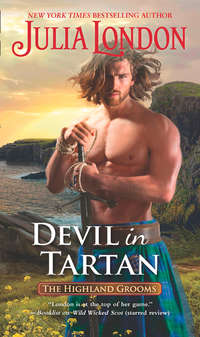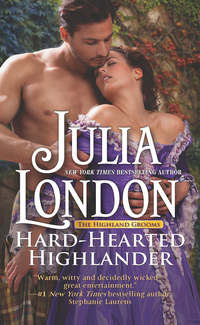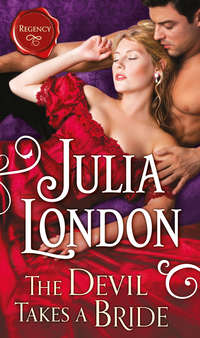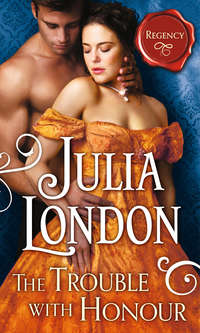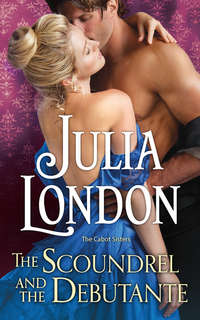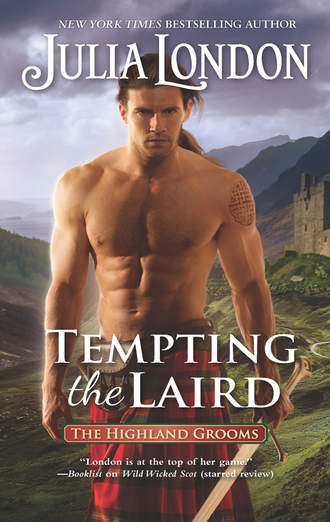
Полная версия
Tempting The Laird
She nodded. “I’ve my own suite of rooms.”
“How wonderful. I should imagine them quite grand, aye?”
“They are,” the lass agreed matter-of-factly, and traced her finger over the figurine that Uncle Knox had been examining. “I have two rooms, I do, but one is for sitting, and one for sleeping. That’s the way of proper ladies.”
“I see,” Catriona said.
“Eula.”
The deeply masculine voice was quiet but firm, and Eula was so startled that she knocked the figurine to the carpeted floor. Catriona bent down and picked it up. She smiled and winked at Eula before she rose, and returned the figurine to the table. She looked over the lass’s head at the duke. He’d donned a proper coat, but he was still lacking a collar or neckcloth. And he had not, she noted, combed his thick, black hair.
“You’re to be at your studies,” he said coolly.
“But we have callers,” Eula said.
“Rather, I have callers. You have studies. Go on, then.”
“Aye, all right,” Eula said with dejection, and began to slink to the door, but at the pace of a slug, pausing to examine the tassel on a pillow, an unlit candle. When she at last reached the door, she glanced back.
“Feasgar math,” Catriona said with a smile.
The lass’s pretty brown eyes widened with surprise.
“Good afternoon,” Catriona translated.
Eula smiled with delight. She waved her fingers and sort of slid around the duke. As she went out, the duke ran his hand affectionately down her arm. So he cared for the wee minx. Which meant he wasn’t entirely reprehensible.
The duke closed the door behind Eula and looked at Catriona and Knox expectantly.
“Very kind of you to receive us, your grace,” Uncle Knox said. “I should have sent a messenger—”
“Aye,” he said curtly.
Catriona arched a brow. Was he miffed with them still, or merely unpleasant?
“Well, then, we are agreed. In our considerable defense, we’ve only just arrived at Dungotty.”
The duke said nothing.
“It’s ours now, you see,” Uncle Knox said.
Still nothing.
“It was an exceptionally good investment,” Uncle Knox added quite unnecessarily. Catriona politely cleared her throat, which caught her uncle’s attention.
“Yes, well, I have come for the summer, which is what brings us here today, your grace. I should like to extend an invitation to you to dine at Dungotty. I have invited my neighbors to the north, the MacLarens. Are you acquainted?”
The duke regarded Uncle Knox a long moment before responding. “I am.”
“Splendid! We will have a fine evening of it. I’ve brought a cook from France, and I do not overstate his culinary skill, I assure you. You will not be disappointed, your grace.”
The duke folded his arms across his chest as if he anticipated Uncle Knox would say more. His eyes, black as coal, moved to Catriona and flicked over her.
“You need not answer straightaway, of course,” Uncle Knox continued. “You will need time to consult your diary, quite obviously, busy man that you must be. We should like to dine on Thursday evening if it pleases you, so if you would be so kind to grant us the favor of your reply by Wednesday, it would be most appreciated.”
The duke stared at Uncle Knox with a clenched jaw. It was curious that he should be so tense in the face of an invitation to dine. Curious and rude. Uncle Knox, quite unaccustomed to taciturnity in anyone, looked helplessly at Catriona.
She stepped forward and took her uncle’s arm. “At any other time we would be delighted to stay for tea, your grace, but as it happens, we’ve many calls to make today.”
His gaze narrowed. “I didna invite you to tea.”
“No?” she said cheerfully. “Then I do beg your pardon. I must have assumed you would as it would be the courteous thing to do, aye?”
“Oh,” Uncle Knox muttered, and squeezed her hand. “Oh, no. No, Cat,” he muttered.
But the duke was not bothered by her pointed remark because he said, “I donna disagree,” and moved to one side and opened the door, thereby giving them a clear path to an exit.
“Thank you,” Catriona said, and curtsied deeply. “We do look forward to your favorable reply, despite your obvious displeasure with the invitation.”
“Oh, dear me,” Uncle Knox said. “Your grace,” he said with a nod of his head, and with his hand firmly on her elbow, he escorted Catriona past the duke. She wouldn’t know if the duke watched them go or not, for she refused to look at him.
In the hallway, Stuart appeared seemingly from nowhere, and with a sweep of his hand, he indicated the path to the main doors, then walked briskly ahead of them. When they reached the foyer, a footman was on hand to open that door so they would not be hindered for even a moment in their departure with a bothersome wait for someone to turn a knob. And no sooner had they stepped onto the landing than the door closed behind them so suddenly that Catriona turned her head to assure herself that her gown had not been caught.
“Well,” Uncle Knox said, yanking on his sleeves, “I’ve scarcely met a ruder man.”
“He’s absolutely diabolical, is he no’?” Catriona asked with gleeful terror as the two of them began their walk down the steps. “I’m more determined than ever to know if he is a murderer, that I am.”
“I would caution you in pressing your cause, darling, for if he is indeed a murderer, he may very well determine you ought to be murdered.”
“True,” she said thoughtfully. “Then again, he might no’, aye?” She winked at her uncle.
“I’ve indulged you in this chase, but I’ve done all that I can for you, darling. You should have heard the hue and cry Mrs. Templeton unleashed when I said we meant to invite him to dine. One would think she was being murdered that very moment. If you want my opinion, you should not concern yourself with him at all. He has a black reputation. They say he is a candidate for the House of Lords, but I can’t see how that could possibly be, given his sour demeanor and penchant for disposing of unruly wives.” He paused. “Or perhaps that is the very thing that recommends him.”
“You believe it!” Catriona said triumphantly. “You believe he’s done something awful to his wife. You do, Uncle Knox!”
He patted her hand. “I’ve not yet made up my mind, but after today’s interview, I am leaning toward the affirmative. Hopefully, he will agree to dine with us so that we might glean something.”
Catriona laughed.
They climbed into the cabriolet. She took the reins from a groomsman and guided the team around. She had the strongest desire to look back at the massive ducal seat as they rode away, but she wouldn’t allow herself to do it. Still, she had the strangest feeling they were being watched. Perhaps he was studying her back, determining where, precisely, to insert the dagger. Perhaps the ghost of the duchess was watching her.
* * *
THEIR NEXT ORDER of business was to call on the MacLarens. Uncle Knox had only recently met the influential laird MacLaren, and he was rather taken with him. Catriona could instantly see why when she was introduced—MacLaren had the same build as her uncle, was roughly the same age and possessed a booming laugh that he employed frequently. “You will be amazed at my collection of American tobacco products,” he crowed as he and his wife led Catriona and her uncle into a receiving salon.
“Ah, American tobacco. A finer cheroot I’ve not enjoyed,” Uncle Knox said as he took up a position at the hearth.
Catriona looked at him curiously. “How have you come upon American cheroots?”
“My dear, my acquaintances stretch round the globe,” he said, and drew a large circle in the air.
Mr. MacLaren burst into loud laughter. “Then you must have a look at my American tobacco, sir, aye? You’ve no’ had as fine as this, on that you may depend.” And with that, he whisked Uncle Knox away to some lair to admire tobacco.
Mrs. MacLaren summoned tea for the two of them. Like her husband, she was jovial, and the small salon felt as gay as its mistress.
“How long will you grace us at Dungotty, then?” she asked Catriona as she poured tea.
“No’ long at all,” Catriona said. “Perhaps a fortnight, but no more. I’ve pressing business at home.”
Mrs. MacLaren did not inquire as to the pressing business as Catriona had hoped—she welcomed any chance to talk about Kishorn. “No’ for the summer? Dungotty is so lovely this time of year, what with all the peonies. The Hays, the former occupants, took great pride in their gardens.”
She had no doubt they did before they were summarily ousted. “They are indeed bonny,” she said. She picked up her teacup. “By the bye, we invited the Duke of Montrose to dine with us Thursday evening.”
Mrs. MacLaren’s surprise was evident in the manner her dark brows rose almost to her powdered hair. “Really,” she said, and put down her teacup, as if she couldn’t hold the delicate china and absorb the news at the same time. “That’s...surprising. He so rarely leaves Blackthorn.”
“Oh?” Catriona asked innocently. “Perhaps, but he’s our neighbor all the same. It would be rude not to have extended the invitation, aye?” She sipped her tea, then said coyly, “I’ve heard what is said of him.”
Mrs. MacLaren looked a wee bit nonplussed. “Aye, he’s been the subject of wretched gossip.” She stirred sugar into her cup and added, “I canna imagine there’s a soul in these hills who’s no’ heard what is said of him.”
“Do you believe it?” Catriona asked.
Mrs. MacLaren frowned. “I donna know what I believe, in truth. Lady Montrose was much beloved in and around Blackthorn.”
“It seems impossible that anyone can simply vanish, much less a duchess, aye?”
Mrs. MacLaren nodded. “Particularly such a bonny young woman. A true beauty, that she was. Och, but she was full of light and love, and younger than the duke. Quite young, really. And him so brooding,” she said with a shiver.
“Is he?” Catriona asked. She had thought him rude. But brooding?
“Rather distant, he is. But I suppose that’s to be expected from a duke.”
Catriona didn’t suppose any such thing, but she kept that opinion to herself. “What did the duchess look like?” Catriona asked.
“Oh, she had beautiful ginger hair and piercing green eyes,” Mrs. MacLaren said, happier to speak of the duchess. “A true beauty, that she was. He must have believed so, too, for he had her portrait made and hung it in the main salon at Blackthorn.”
“Why would anyone assume he’d murdered her, do you suppose?” Catriona asked. It seemed so curious to her that murder should be everyone’s assumption, rather than believing the duke had cast his wife out. A woman who’d been cast out by her husband had turned up at Kishorn Abbey a year or so ago. Did someone somewhere believe that woman had been murdered?
“I can hardly guess the workings of a deviant mind,” Mrs. MacLaren said with a slight sniff. “What I do know is that passion can often be a dangerous thing between two people. But I shall no’ speak ill of the duke,” she said, in spite of having just spoken ill of the duke. “He’s no’ been charged with a crime, has he? To speculate would be to malign his reputation, and no matter what else, he’s done a lot of good for his tenants. But he’s made no friends for himself, that is true. And besides...” Mrs. MacLaren’s voice trailed away.
“And besides?” Catriona gently prodded.
“Well...it was no secret that there was great unhappiness at Blackthorn.”
That was a foregone conclusion. Happy homes did not lose a member here and there. “What sort of unhappiness?”
“I know only it’s been said,” Mrs. MacLaren demurred, and sipped her tea. “Ah, but she was a bonny woman, indeed she was. Devoted to the staff and their families. And he, well...he was rarely seen about. Quite cold, that one. It will be a curious thing to see him in society.”
“I saw him in the common room at the Red Sword and Shield on the day I arrived,” Catriona said.
“Did you? Perhaps he’s changed his ways. God knows he needed to. All right,” Mrs. MacLaren said, putting her teacup down again. “Enough of the duke. Is it true that your uncle has brought Russians to Dungotty?” she asked.
Catriona said it was true, and as Mrs. MacLaren began to speak of a chance meeting with a Russian count several years ago, Catriona thought of the dark-eyed man with the stern countenance and the portrait of his wife—Dead wife? Missing wife?—hanging in his salon.
Catriona hoped he would come to dine. She hadn’t been as diverted by a terrifyingly slanderous tale in ages.
Fortunately for her, they received the duke’s favorable reply on Wednesday.
CHAPTER FIVE
“YOU’RE CERTAIN OF THIS, are you?” Hamlin asked.
“Aye,” Eula said. She was standing on a chair before him, working on the knot of his neckcloth, her brow furrowed in concentration.
“I was speaking to Mr. Bain,” he said, and touched the tip of his finger to her nose.
“Aye, your grace, that I am,” a voice behind Hamlin said.
Hamlin eyed the reflection of his secretary, Nichol Bain, in the mirror. He was leaning against the door frame, his arms folded across his chest, watching Eula’s ministrations. The auburn-haired, green-eyed young man was ambitious in the way of young men. He didn’t care about the rumors swirling around Hamlin, he cared about performing well, about parlaying his service to a duke to a better position. What would that be, then? Service to the king? Hamlin could only guess.
Bain had come to Hamlin through the Duke of Perth, the closest friend of his late father. As Hamlin had been a young man himself when he’d become a duke, Perth had taken him under his wing, and twelve years later, like his father before him, Hamlin considered Perth his closest adviser. Perth had brought Bain to him, had vouched for what Hamlin had thought were rather vague credentials.
Bain’s expression remained impassive as he calmly returned Hamlin’s gaze in the mirror. The man was impossible to discern. Whatever he thought about any given situation, he kept quite to himself unless asked. But he’d made up his mind about tonight’s dinner at once when Hamlin had asked. Frankly, he’d hardly thought on it at all. He’d said simply, “Aye, you must attend.”
Hamlin looked at himself in the mirror, eyeing his dress. He’d not seen about acquiring another valet since the last one had “retired” from his post after the fiasco with Glenna. He’d never been anything but perfectly civil to the man, and yet he’d believed the talk swirling around his master. Fortunately, Hamlin was quite capable of dressing himself and had donned formal attire. His waistcoat was made of silver silk, his coat and breeches black. Alas, Eula’s attempt to tie his white silk neckcloth had not met with success.
“I think it a waste of time,” he said to his reflection, returning to his conversation with Bain. “Nothing of consequence can come of it.”
“It is well-known that the Earl of Caithness is unduly influenced by MacLaren’s opinion. A vote from Caithness will be instrumental, if no’ decisive,” Bain said. “It could verra well be the vote to put you in the Lords, aye? The more familiar you are with the Caithness surrogate, the better your odds.”
Hamlin responded with a grunt. If he secured a seat in the House of Lords, it would be nothing short of a small miracle. Scotland was allowed sixteen seats, and those seats were determined by a vote of the Scottish peers. Four had opened, and his name had been put forth by virtue of his title. But his appointment, which had once been seen as a fait accompli, was now tenuous at best. People did not care to be represented by a man rumored to be a murderer.
“You see this as an opportunity to be familiar with MacLaren. I see it as an opportunity for a lot of scandalmongers to invent a lot of scandal.”
“What does it mean, scandalmonger?” Eula asked.
“It means busybodies have been invited to dine, that’s what.”
She shrugged and hopped down from the chair, her task complete. “Will the lady attend?”
“What lady?” Hamlin asked absently as he tried to straighten the mess she’d made of his neckcloth.
“The bonny one with the golden hair.”
And the gray-blue eyes. He could not forget those eyes sparkling with such mischievous delight. She was a minx, that one. It seemed of late that when most women viewed him at all, it was with a mix of horrified curiosity and downright fear. But Miss Mackenzie had looked at him as if she wanted to either challenge him to a duel or invite him to dance. He didn’t know what to make of her forthright manner, really. He wondered if anyone had ever tried to bring her to heel. She was not a young debutante, that much was obvious, but a comely, assured woman, scarcely younger than he. Which raised the question of how a beautiful woman of means was not married? “I believe she will be, aye,” he said to Eula.
“I rather like her,” Eula said.
Of course she did—Eula was a wee minx herself, and with no woman to properly guide her, she was turning into a coquettish imp. “Where is your maid, then, lass? ’Tis time for your bed, I should think.”
“Already?” Eula complained.
“Already.” He leaned down and kissed the top of her head.
“You look very fine, Montrose,” she said, eyeing him closely.
“Your grace,” he reminded her.
“Your grace Montrose,” she returned with a pert smile. In the mirror’s reflection, Hamlin caught Bain’s slight smile of amusement.
“Off you go, then. I’ll come round to see you on the morrow, aye?”
“Good night,” she chirped, and skipped out, intentionally poking Bain in the belly as she passed him.
When she had gone out, Hamlin undid his neckcloth and began to tie it again. “You’re convinced, are you, that given all that has happened, I still stand a chance at gaining a seat?” Hamlin asked bluntly.
“No’ convinced, no, your grace,” Bain said. “But if anyone will consider a change of heart, ’tis MacLaren. He would keep the seat close to home and his interests rather than stand on principle.”
Apparently, Hamlin was the unprincipled choice for the seat. He mulled that over as he retied his neckcloth. He was not shocked that MacLaren might advocate for him for less than principled reasons—a seat in the Lords wielded considerable power in Scotland, and Hamlin would be expected to return favor to whomever had supported him. But he wasn’t convinced that MacLaren’s lack of principle would extend all the way to him. He could very well have another candidate in the wings.
Never mind all this dithering about the evening on his part. He’d sent his favorable reply to Norwood on Bain’s recommendation and would attend this bloody dinner. He was, if nothing else, a man of his word.
His butler appeared in the doorway and stood next to Bain. “Shall I have your mount saddled, your grace?”
It was a splendid night for riding, the moon full, the path through the forest that separated Blackthorn Hall and Dungotty pleasant and cool. But before Hamlin could answer, Bain lifted a finger. “If I may, your grace.”
Hamlin nodded.
“To arrive on horseback to an important supper such as this might give the appearance of having suffered a diminishment in your standing. I’d suggest the coach, then.”
A diminishment of standing. Is that what was said of him now? Hamlin sighed with irritation at the lengths he had to go to present himself to a society he’d once ruled and that had been quick to turn its back on him. Before he’d been married, invitations to Blackthorn Hall had been sought after throughout Scotland and even in England—the prospect of marrying a future duke, particularly one with the revered name of Montrose, had brought the lassies from far and wide. Hamlin had had no firm attachment to any of them, and he’d agreed to marry the woman his father had deemed suitable to carry the Montrose name and bear its heirs.
After his marriage, Hamlin and Glenna hosted dinners and balls for the country’s elite in his ailing father’s stead, as was expected of him, the heir. And when his father died, and the title had passed to him, Hamlin had stepped into his father’s shoes. He and Glenna had dined with peers, appeared in society when it was expected. He opened a school and presented funds to a theater troupe. He sat on councils and hunted game and joined men at the gentleman’s club in Edinburgh to complain about the government.
He had performed the duties of a duke in the same distant manner as his father had before him. Not because he was the same distant person his father had been—Hamlin liked to think himself as warmer than his father had ever been—but because he was already having trouble with Glenna and he didn’t want anyone to know.
The trouble with Glenna was not apparent to anyone else before the disaster fell that ruined his life and his spirit, and left him desolate and questioning everything he thought he’d ever known about himself or this world. What had happened at Blackthorn Hall was a disgrace to any man.
That astounding fall from grace was the reason he’d taken Nichol Bain into his employ. The first thing Bain had said to Hamlin the day they met was I am the man who might repair your reputation, I am.
Normally, Hamlin would have taken offense to that. But he was intrigued by Bain’s lack of hesitation to say it, and he was acutely aware that his reputation was in critical need of repair. This was, in fact, the first invitation he’d received in several months.
“Aye, Stuart, do as he says, then,” Hamlin conceded. “The coachmen and the team will no’ care to stand about waiting for a lot of fat Englishmen to dine, but that’s their lot in life, it is.”
* * *
THE EMBLAZONED MONTROSE coach drew to a halt in the circular drive at the Dungotty estate, and two footmen sprinted to attend it. The door was opened for Hamlin, a step put down for his convenience to exit the coach. The front door likewise opened for him before Hamlin could reach it, and a man wearing a powdered wig and a highly embroidered, fanciful coat stepped forward, bowed low and said, “Welcome to Dungotty, your grace.”
“Thank you.” He handed the man his hat as he stepped into the foyer. The grand house had had a bit of work done to it since Hamlin had last seen it, which he recalled was at least a decade ago, before his marriage. Marble flooring had replaced wooden planks, and an expansive iron-and-crystal chandelier blazed with the light of a dozen candles overhead. The stairs leading to the first floor were dressed in expensive Aubusson carpets, the railing polished cherry.
Hamlin removed his cloak, handed it to yet another footman and wondered just how many footmen an English earl actually needed for summering in Scotland. He’d seen more tonight than he had on staff at Blackthorn Hall, which was twice the size of this house.
The sound of laughter suddenly rose from a room down a long hall. Hamlin immediately tensed—it sounded as if there were more souls laughing than the four he expected, which were the MacLarens, Norwood and his niece.
“This way, if you please, your grace,” the butler said, and walked briskly in the direction of the laughter, down a corridor and to a set of double doors. He placed both hands on the brass handles, paused and gave his head a bit of a shake, then practically flung the doors open. He stepped inside and loudly cleared his throat. Standing behind him, Hamlin could see a number of heads swivel around. Damn it to hell, he’d been waylaid by that old English goat. There was a crowd gathered in this room.
The butler bowed and said quite grandly, “My Lord Norwood, may I present his grace, the Duke of Montrose.”
Hamlin moved to step forward, but the butler was not quite done.
“And the Earl of Kincardine,” he added, just as grandly.
Hamlin waited a moment to ensure that was the end of it, but as he moved his foot, the butler added with a flourish, “And the Laird of Graham.”


